Introduction
Close your eyes and imagine the African wilderness—vast, untamed, and teeming with life. You can almost hear the distant roar of a lion and feel the earth tremble as a herd of elephants passes by. Africa is the ultimate safari destination, but with so many options, where do you go? Some countries offer an experience that’s nothing short of magical, where every moment feels like a scene from a nature documentary.
From the iconic Maasai Mara in Kenya to the mystical landscapes of Namibia, these destinations are the crown jewels of African safaris. Each country has its own unique rhythm and story, inviting you to witness the wild in its most raw and beautiful form. Ready to discover the best safari spots that Africa has to offer? And guess what! You won’t want to miss this journey into the heart of the wild.
1. Tanzania
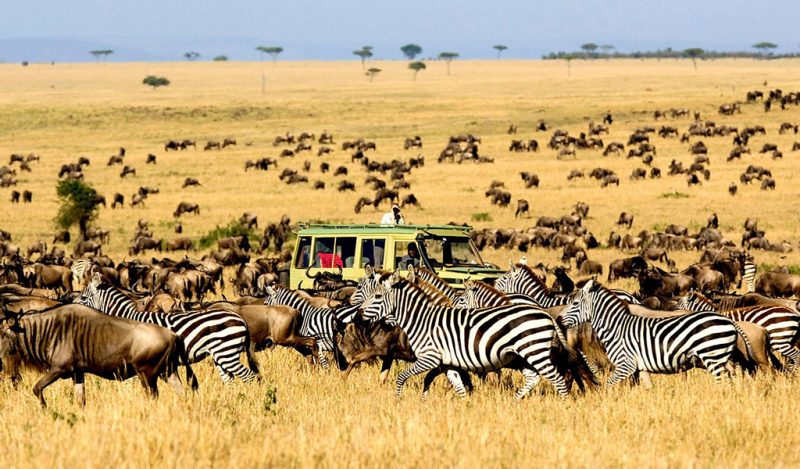
Opt for Tanzania if you’re a nature lover and adventure seeker. It’s home to the Serengeti, where the Great Migration happens, and Kilimanjaro, Africa’s highest peak. You also find the stunning Zanzibar beaches, which are perfect for relaxation after a safari. The country’s rich cultural tapestry and impressive wildlife make it a standout choice.
Pros
- Visit the Serengeti for the world-famous Great Migration and an abundance of wildlife.
- Take on the challenge of climbing Mount Kilimanjaro, a bucket-list adventure.
- Unwind on Zanzibar’s pristine beaches, known for their crystal-clear waters.
- Witness the incredible wildlife in the Ngorongoro Crater.
- Engage with Tanzania’s diverse tribes and cultural traditions.
- Enjoy relatively affordable safari options compared to other top safari destinations.
- Experience the warmth and hospitality of the Tanzanian people.
- Explore Stone Town’s rich history and unique architecture.
- Discover Tanzania’s varied ecosystems, from savannas to rainforests.
- Dive or snorkel in the vibrant marine ecosystems around Zanzibar.
Cons
- Face high entrance fees for national parks and reserves.
- Deal with some areas lacking in modern infrastructure.
- Experience long travel times between major attractions.
- Be cautious about health risks like malaria in certain regions.
- Manage large crowds, especially during peak seasons.
- Overcome language barriers, particularly in rural areas.
- Encounter inconsistent service quality in less touristy areas.
- Stay vigilant against petty crime in urban areas.
- Be prepared for unpredictable weather, especially in highland areas.
- Find limited nightlife options outside major cities.
Tanzania offers a wealth of experiences, from safaris to beach holidays. The Serengeti is famed for its migration of wildebeest and zebras, while Mount Kilimanjaro provides a challenging climb with spectacular views. Zanzibar, with its idyllic beaches, is perfect for unwinding after adventurous days. Ngorongoro Crater is a UNESCO World Heritage Site and a haven for wildlife enthusiasts. Tanzania’s mix of natural beauty and cultural richness makes it a compelling destination.
2. Kenya
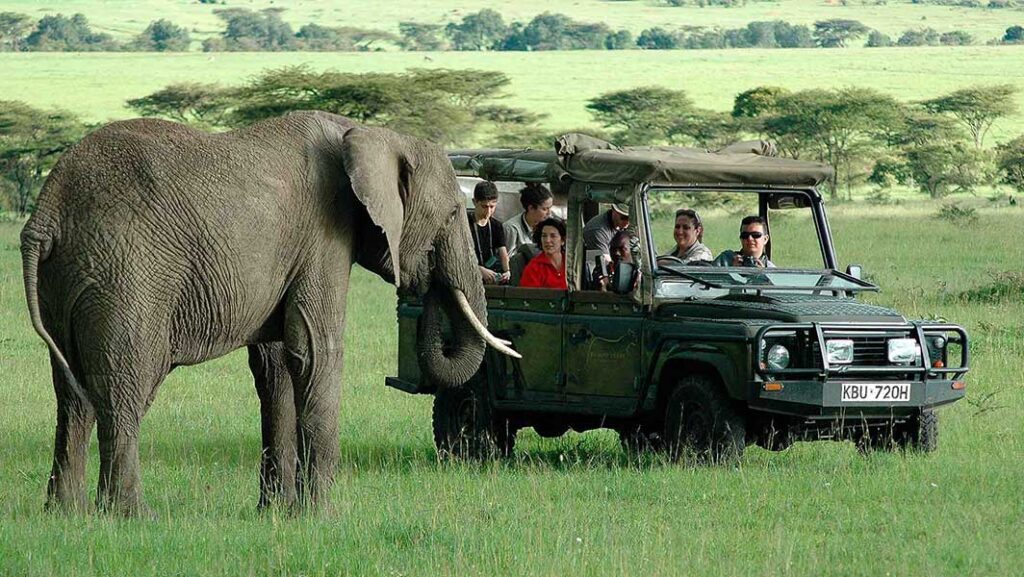
Are you looking for a diverse range of activities and experiences? Kenya is renowned for its dynamic safari experiences and beautiful landscapes. From the iconic Masai Mara and its Great Migration to stunning coastlines and vibrant cities, Kenya offers something for travelers like you.
Pros
- Witness the Great Migration in Masai Mara, a breathtaking natural spectacle.
- Enjoy a variety of safari experiences across different parks like Amboseli and Samburu.
- Relax on Kenya’s gorgeous beaches in Mombasa or Diani.
- Engage with Kenya’s diverse cultures, including the Maasai and Swahili communities.
- Hike Mount Kenya or explore the Great Rift Valley’s dramatic landscapes.
- Experience the bustling urban life of Nairobi with its markets, museums, and nightlife.
- Choose from a wide range of accommodation options, from luxury lodges to budget camps.
- Observe a rich variety of wildlife, including the Big Five.
- Enjoy diverse Kenyan cuisine, with influences from various cultures.
- Support Kenya’s active conservation programs and wildlife protection initiatives.
Cons
- Navigate high visitor numbers in popular parks during peak times.
- Manage long travel distances between major safari destinations.
- Stay aware of safety concerns in urban areas and some rural regions.
- Prepare for health risks like malaria in certain areas.
- Experience variability in infrastructure quality, especially in remote regions.
- Face high costs for certain safari activities and high-end lodgings.
- Deal with heavy traffic in Nairobi and other large cities.
- Ready for unpredictable weather patterns, particularly during the rainy seasons.
- Respect local customs and traditions to enhance your experience.
- Avoid tourist traps that can affect the quality of your visit and inflate costs.
Kenya is a premier destination for safari enthusiasts with its diverse landscapes and abundant wildlife. The Masai Mara’s Great Migration is a highlight, providing an awe-inspiring view of nature’s greatest spectacle. Kenya’s coastline offers beautiful beaches ideal for relaxation and water activities. Nairobi provides a cultural and urban contrast with its vibrant markets and museums. The country’s combination of natural beauty and rich cultural experiences makes it an exciting travel destination.
3. Botswana
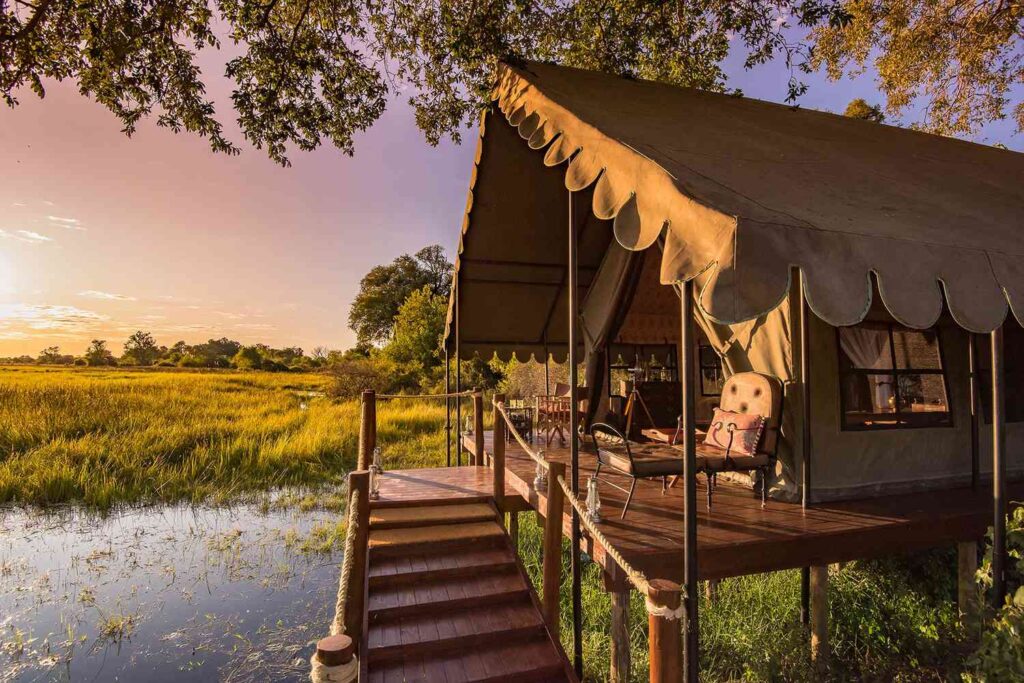
Do you seek an unspoiled nature? Botswana stands out for its pristine wilderness areas and low tourism density. It’s known for its high-end eco-tourism and exclusive safari experiences. The Okavango Delta, one of the world’s largest inland deltas, and Chobe National Park’s large elephant herds make Botswana indeed worth seeking.
Pros
- Explore the Okavango Delta, a unique inland delta with incredible wildlife and bird watching opportunities.
- See large elephant herds and diverse wildlife in Chobe National Park.
- Enjoy high-quality, low-density safari experiences in exclusive lodges.
- Marvel at Botswana’s stunning landscapes, from the Delta’s waterways to the Kalahari Desert.
- Support strong conservation efforts and sustainable tourism practices.
- Experience true wilderness with fewer crowds and untouched landscapes.
- Learn about local cultures, including the San people and their traditional lifestyles.
- Participate in unique activities like mokoro (canoe) safaris and walking safaris.
- Benefit from a generally safe travel environment with low crime rates.
- Stay in comfortable lodges and camps designed to blend with the environment.
Cons
- Face high costs for safari lodges and activities, which can be pricey.
- Deal with limited accessibility to some remote areas.
- Prepare for extreme weather conditions, particularly in the desert regions.
- Experience seasonal variability in wildlife visibility and water levels in the Delta.
- Manage the logistics of traveling to and within remote areas.
- Encounter limited infrastructure outside major tourist zones.
- Navigate language barriers as not all guides speak English fluently.
- Handle the effects of high visitor numbers in popular lodges and camps.
Botswana is renowned for its commitment to conservation and providing authentic wilderness experiences. The Okavango Delta offers a unique safari experience with its network of waterways and rich wildlife. Chobe National Park is famous for its large elephant herds and excellent game viewing. Botswana’s emphasis on low-impact, high-quality tourism ensures a more exclusive and immersive experience. While the costs can be high, the unmatched beauty and tranquility make it a worthwhile destination for nature enthusiasts.
4. South Africa
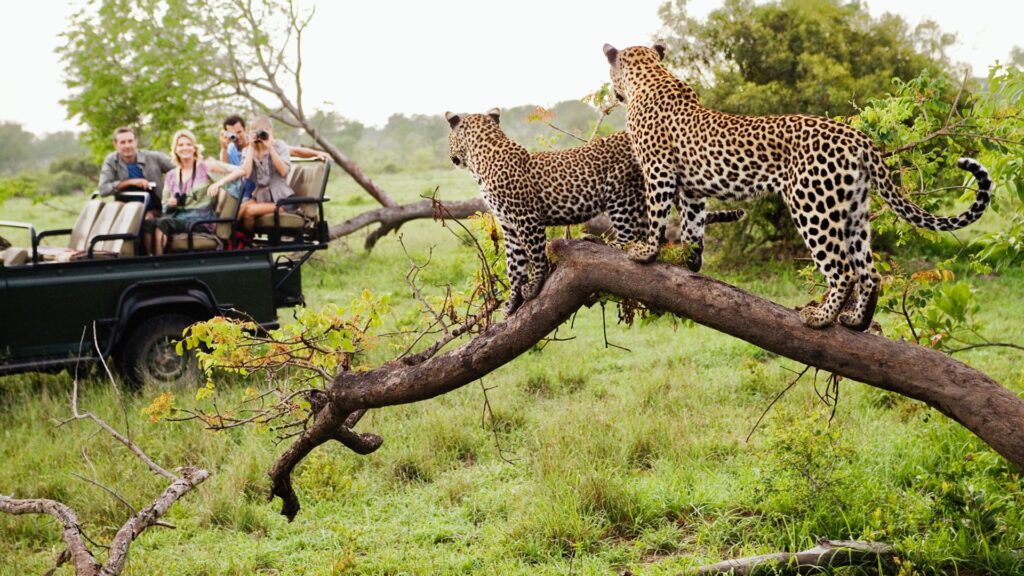
South Africa is a diverse country offering a mix of vibrant cities, world-class safaris, and beautiful coastlines. It’s a perfect place if you want a combination of urban experiences and outdoor adventures. From Cape Town’s stunning scenery to Kruger National Park’s incredible wildlife, South Africa has something for you.
Pros
- Experience diverse safari options in Kruger National Park and other top reserves.
- Enjoy Cape Town’s breathtaking landscapes, including Table Mountain and the Cape of Good Hope.
- Explore South Africa’s rich cultural heritage in cities like Johannesburg and Cape Town.
- Discover world-renowned wine regions like Stellenbosch and Franschhoek.
- Relax on South Africa’s stunning beaches, from Durban to the Western Cape.
- Participate in adventure sports like shark cage diving, bungee jumping, and hiking.
- Find a range of accommodation options, from budget to luxury.
- Taste a diverse range of cuisines reflecting South Africa’s multicultural influences.
- Benefit from well-developed infrastructure and amenities.
Cons
- Be aware of safety concerns and petty crime, particularly in urban areas.
- Manage high entrance fees and costs for certain safari activities.
- Deal with long travel distances between major attractions.
- Navigate heavy traffic in major cities like Johannesburg and Cape Town.
- Be mindful of cultural sensibilities and local customs.
- Handle high tourist density in popular attractions during peak seasons.
- Stay cautious of petty crime, especially in urban centers.
South Africa provides a rich tapestry of experiences. Cape Town, with its stunning natural beauty and vibrant cultural scene, contrasts with the wild landscapes of Kruger National Park, where you can enjoy world-class wildlife viewing. The country’s wine regions offer gourmet experiences and scenic drives. South Africa’s diverse landscapes, from beaches to mountains to savannas, and its blend of urban and natural attractions make it a multifaceted destination. While there are safety and cost considerations, the range of activities and sights more than compensate for these challenges.
5. Namibia
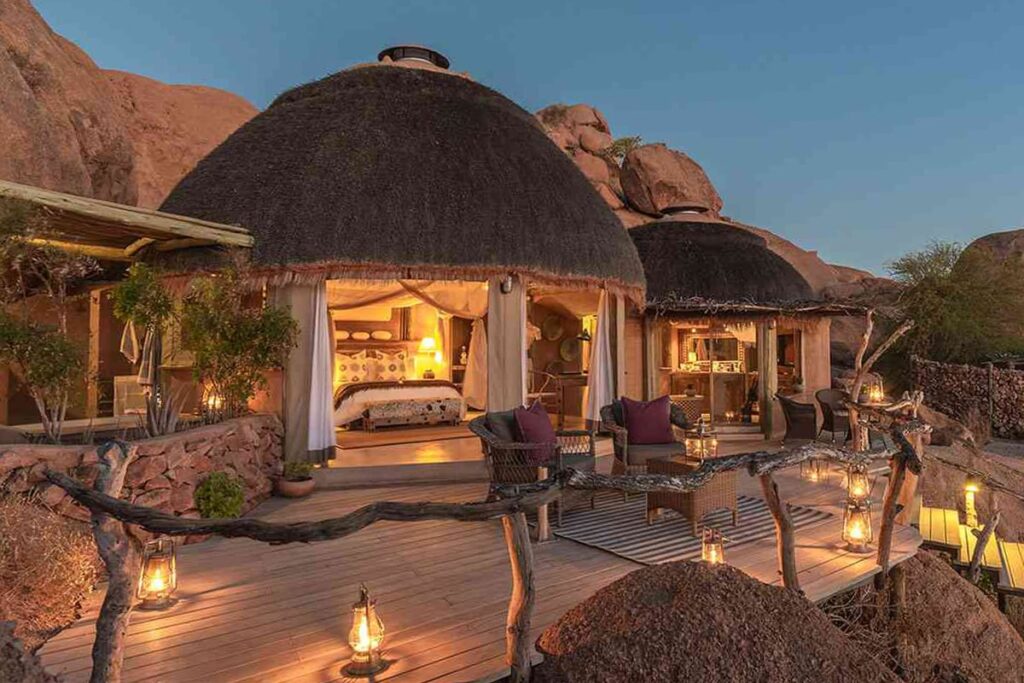
Namibia is a land of dramatic landscapes and wide-open spaces, consider it if you’re seeking a more solitary and scenic experience. From the vast dunes of the Namib Desert to the wildlife-rich Etosha National Park, Namibia offers a unique blend of natural wonders and adventure.
Pros
- Marvel at Namibia’s stunning landscapes, including the Namib Desert’s towering dunes and the Skeleton Coast.
- Explore Etosha National Park for excellent game viewing, including rhinos, lions, and elephants.
- Enjoy unique desert experiences like dune climbing and scenic flights over the desert.
- Benefit from low tourist density and the chance to experience unspoiled nature.
- Learn about the culture of the Himba people and other local tribes.
- Take scenic drives through diverse environments, from deserts to lush areas.
- Stay in high-quality lodges and camps designed to blend with the environment.
- Participate in adventurous activities like sandboarding and quad biking.
Cons
- Navigate the challenges of traveling to and within remote regions.
- Deal with limited infrastructure outside major tourist routes.
- Be aware of health risks such as sun exposure and dehydration.
- Manage long distances between major attractions, which can make travel times lengthy.
- Experience seasonal variability in weather and wildlife visibility.
- Find limited nightlife and entertainment options.
Namibia is known for its dramatic and diverse landscapes, from the surreal dunes of Sossusvlei to the arid expanse of the Namib Desert. Etosha National Park offers some of Africa’s best wildlife viewing in a unique salt pan setting. The country’s low population density and vast spaces provide a sense of isolation and tranquility. While the costs and remote travel can be challenging, Namibia’s extraordinary landscapes and adventure opportunities make it a compelling destination if you seek natural beauty and solitude.
6. Zimbabwe
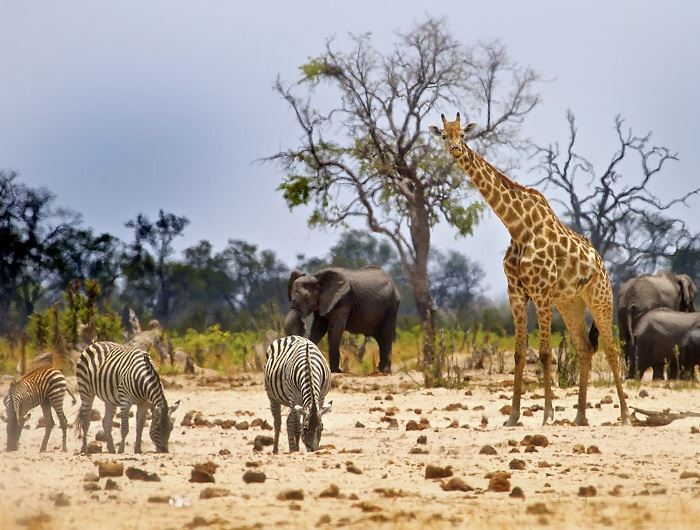
Zimbabwe is a great destination for seeking adventure, wildlife, and a touch of history. This country boasts incredible safari experiences, stunning landscapes, and historical sites like Great Zimbabwe.
Pros
- Witness the awe-inspiring Victoria Falls, one of the world’s largest and most famous waterfalls.
- Experience rich wildlife viewing in Hwange National Park and Mana Pools National Park.
- Explore the ancient ruins of Great Zimbabwe, a UNESCO World Heritage site.
- Enjoy adventure activities such as whitewater rafting and bungee jumping near Victoria Falls.
- Appreciate Zimbabwe’s diverse landscapes, from savannah to lush wetlands.
- Engage with local cultures and communities to learn about Zimbabwean traditions.
Cons
- Navigate economic instability, which can affect travel experiences and services.
- Be aware of safety concerns and political instability in certain regions.
- Face limited access to some remote or less-developed areas.
- Experience variability in service quality, especially outside major tourist centers.
Zimbabwe offers a combination of adventure, wildlife, and cultural exploration. Victoria Falls is a major highlight, offering breathtaking views and a range of adrenaline-pumping activities. Hwange and Mana Pools National Parks provide excellent wildlife viewing in less crowded settings. Great Zimbabwe’s ancient ruins add a historical dimension to your visit. While economic and infrastructure challenges exist, Zimbabwe’s natural beauty and rich cultural experiences make it a unique and rewarding destination.
7. Uganda
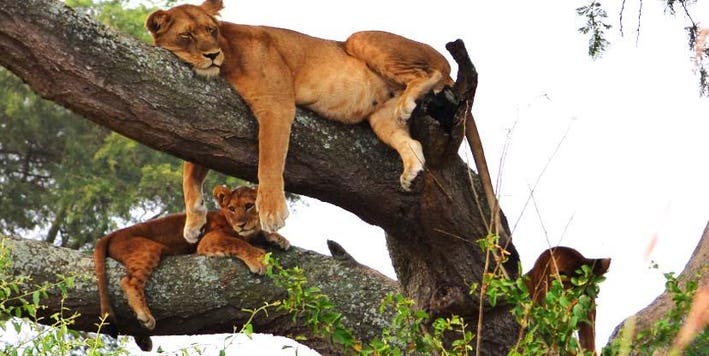
Uganda is famous for its gorilla trekking experiences, making it a top choice for wildlife enthusiasts. The country offers a rich blend of wildlife, lush landscapes, and cultural experiences. It’s perfect for you if you’re looking for an immersive adventure with opportunities to see rare species up close.
Pros
- Experience the thrill of gorilla trekking in Bwindi Impenetrable Forest and Mgahinga Gorilla National Park.
- Enjoy chimpanzee tracking in Kibale National Park, known for its high primate diversity.
- Explore diverse landscapes, from rainforests to savannahs and lakes.
- Observe a wide variety of bird species, making it a bird watcher’s paradise.
- Discover unique wildlife species in less-visited parks and reserves.
- Appreciate Uganda’s scenic beauty, including Lake Victoria and the Rwenzori Mountains.
- Support important conservation efforts and eco-tourism initiatives.
Cons
- Manage travel logistics as some areas are less accessible.
- Prepare for variable weather conditions, including heavy rainfall.
- Deal with limited amenities and services in less-developed areas.
- Handle tourist density in popular trekking areas.
- Respect local customs and practices to ensure a positive experience.
- Experience variability in service quality, particularly outside major tourist centers.
Uganda is renowned for its gorilla trekking experiences, offering a rare and intimate wildlife encounter. Bwindi Impenetrable Forest and Mgahinga Gorilla National Park are key highlights for primate enthusiasts. Kibale National Park provides excellent chimpanzee tracking opportunities. Uganda’s diverse landscapes, including lakes, mountains, and rainforests, add to its appeal. Despite some infrastructure and health challenges, Uganda’s unique wildlife and cultural experiences make it a remarkable destination.
Overview of the Best African Countries for Safari
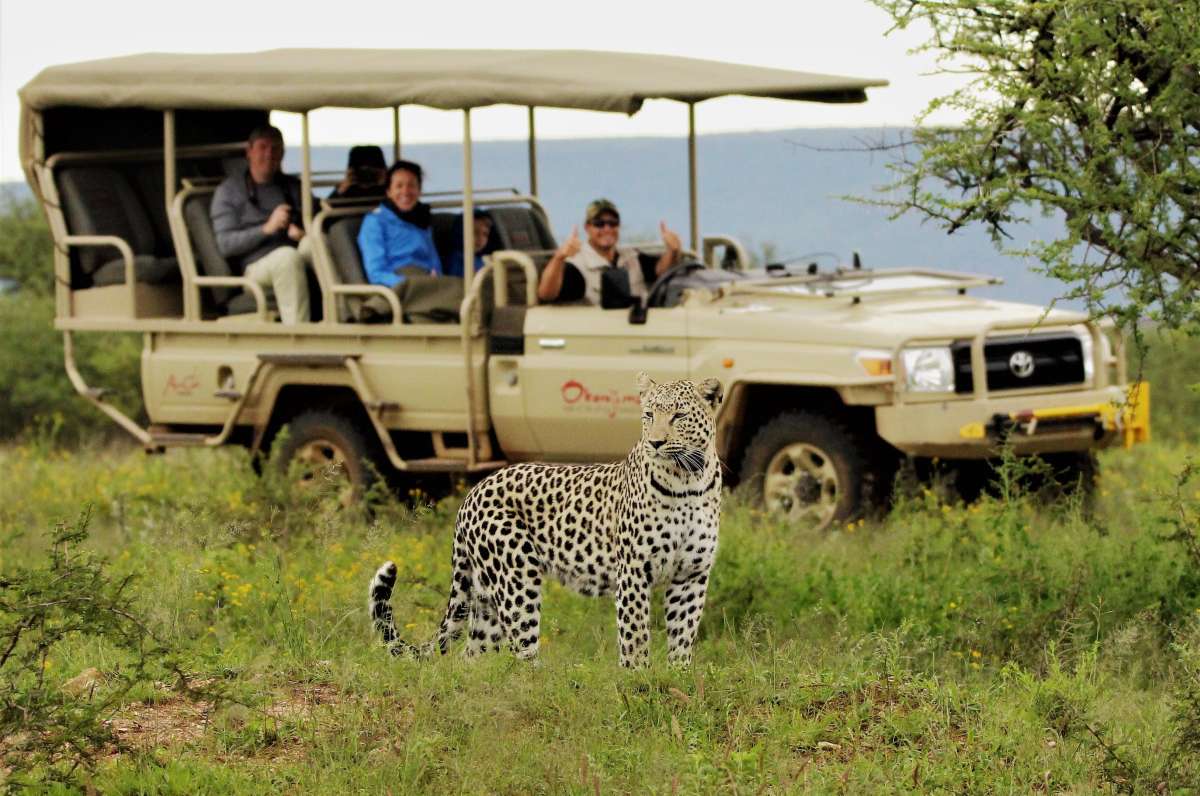
If you’re thinking about going on a safari, you’ve got some incredible options in Africa. This continent offers some of the most breathtaking and diverse wildlife experiences you could ever imagine. Picture vast landscapes where you can see everything from majestic elephants to powerful lions, all in their natural habitat. Whether you’re into the classic savanna scenes or more unique environments like lush wetlands, Africa has it all.
What’s really exciting is that these destinations aren’t just about the animals—although that’s a huge part of the draw. The whole experience immerses you in the beauty of nature, from sunrise game drives to evenings under the stars. Each location offers something special, whether it’s the sheer variety of species, the dramatic scenery, or the chance to learn about local cultures and conservation efforts.
If you’re after adventure, relaxation, or just a deeper connection with nature, an African safari can deliver all that and more. Whether you’re a first-timer or a seasoned traveler, these safari experiences are designed to leave you in awe, giving you memories that will last a lifetime. So, if you’re ready to see nature at its most raw and beautiful, Africa’s safaris are where you need to be.
How to Choose the Best African Country for Safari
What animals do you most want to see? If the Big Five (lion, leopard, elephant, buffalo, and rhino) are your priority, countries like Kenya, Tanzania, and South Africa should be at the top of your list. For gorilla trekking, Uganda and Rwanda are your best bets. If you’re interested in seeing unique species like desert-adapted elephants or antelope, Namibia is the place to go.
The time of year you plan to travel can significantly affect your safari experience. But guess what! The dry season from June to October is usually the best time for game viewing, as animals congregate around water sources. However, this is also the peak tourist season, so parks can be crowded. If you’re interested in the Great Migration, you need to plan carefully as the timing of this event varies each year.
Your budget plays a significant role in determining which country you should visit. South Africa tends to be more affordable, especially if you choose to self-drive in Kruger National Park. Botswana and Zambia, on the other hand, cater to more high-end tourism with fewer budget options. It’s also worth considering the cost of flights, visas, and vaccinations when planning your safari.
Are you looking for a luxury experience with plush lodges and gourmet meals, or do you prefer a more rugged, adventurous experience? South Africa and Botswana offer some of the most luxurious safari experiences, while Zambia and Zimbabwe are known for its more adventurous options, such as walking safaris and mobile camps.
If you prefer a more private and exclusive experience, Botswana, Zambia, and Namibia are excellent choices. These countries have a lower tourist density, offering a more intimate safari experience. Kenya and Tanzania, particularly during the Great Migration, can be quite crowded, which may detract from the wilderness experience.
Also, consider the ethical implications of your safari. Botswana is known for its strong conservation policies, and many of its lodges and camps are eco-friendly. Some parks in other countries may struggle with over-tourism, which can negatively impact the environment and wildlife. Doing some research into the conservation efforts of your chosen destination can help you make a responsible choice.
If you have an interest in combining wildlife viewing with cultural experiences, some countries offer more opportunities than others. Kenya and Tanzania, for example, are home to the Maasai people, and many safaris include visits to Maasai villages. In Namibia, you can learn about the Himba people, and in South Africa, there are opportunities to explore the rich history and culture of the country.
Pros and Cons of the Best African Countries for Safari
Pros
- Offer classic safari experiences with vast savannahs and abundant wildlife.
- Provide access to the Serengeti, a top destination for the Great Migration.
- Include opportunities for self-drive safaris, offering flexibility and independence.
- Present a highly exclusive and private safari experience with fewer tourists
- Offer unique gorilla trekking experiences, providing intimate wildlife encounters.
- Provide stunning and unique landscapes, from the Namib Desert to the Skeleton Coast.
- Offer diverse activities, including interactions with the Maasai people.
- Provide opportunities for Big Five sightings in well-managed reserves.
- Offer excellent opportunities for birdwatching and photography.
Cons
- Experience high tourist density, especially during the Great Migration.
- Require careful planning for the Great Migration to be in the right place at the right time.
- Deal with fluctuating weather conditions, affecting game viewing.
- Present high costs, as Botswana focuses on low-volume, high-quality tourism.
- Face challenges with accessibility, as some parks are remote and difficult to reach.
- Experience harsh weather conditions, including extreme heat in the desert.
- Require malaria prophylaxis, as malaria is prevalent in many regions.
- Experience potential overcrowding in popular parks like Serengeti and Ngorongoro.
- Present a more specialized and less varied wildlife experience.
- Require long drives between parks and attractions, which can be time-consuming.
What to Watch Out For
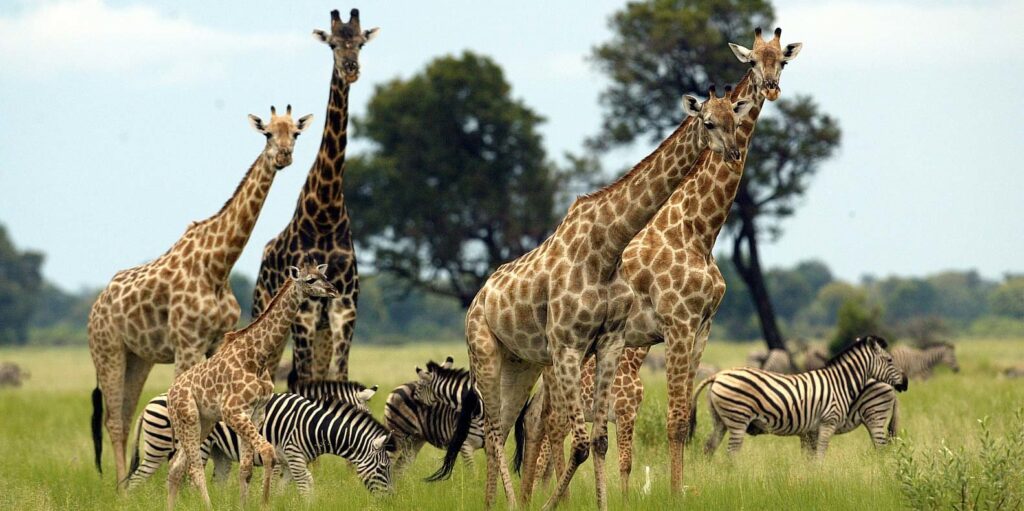
- Ensure you’re aware of the health risks in your chosen destination, including malaria and other tropical diseases. Make sure you have the necessary vaccinations and take appropriate precautions.
- Obtain comprehensive travel insurance that covers medical emergencies, evacuations, and trip cancellations. Safaris can take place in remote areas, so coverage is crucial.
- Research the safety situation in the country you plan to visit. Some regions may have political instability or high crime rates, requiring extra caution.
- Remember that you’re in a wild environment. Always follow the guidelines provided by your guides to avoid dangerous encounters with wildlife.
- Be respectful of local cultures and traditions. This includes appropriate dress, behavior, and interaction with local communities.
- Plan your itinerary carefully, considering the distances between parks and lodges. Some destinations may require long drives or additional flights.
- Choose operators and lodges that prioritize conservation and sustainable tourism. Your choices can have a significant impact on the environment and local communities.
Pro Tips
- Bring neutral-colored clothing, a good pair of binoculars, a camera with a zoom lens, a hat, sunscreen, and insect repellent. Don’t forget a warm layer for early morning and evening game drives.
- Familiarize yourself with the wildlife you may encounter on your safari.
- Consider staying in a private reserve that offers more exclusive experiences, including night drives, walking safaris, and off-road access to wildlife.
- Respect the animals and their habitats. Keep a safe distance, never attempt to feed or interact with the wildlife, and follow your guide’s instructions.
- Drink plenty of water, eat well, and make sure to rest. If you’re in a malaria zone, take your prophylaxis seriously.
- Don’t forget to capture your experiences with photos or videos. A good camera or smartphone with a decent zoom can help you relive your safari long after it’s over.
- Enjoy the entire experience, from the stunning landscapes to the small moments of connection with nature. Sometimes, the most memorable experiences are the unexpected ones.
Recap
Africa is where the magic happens. The continent offers some of the most incredible wildlife experiences you can imagine. Whether you’re dreaming of watching the “Big Five” up close or soaking in the beauty of diverse landscapes, Africa has it all. Each destination offers something unique, from sprawling savannas to lush wetlands, making every safari a new adventure.
What really stands out is how these safaris immerse you in nature. You’re not just observing from a distance; you’re right there in the heart of it all, experiencing the wild in its most natural state. And it’s not just about the animals. The whole experience—waking up with the sun, spending your days exploring, and your nights under the stars—connects you to the land in a way that’s unforgettable.
If you’re looking for a mix of excitement, beauty, and connection with nature, African safaris are where you can find it. These experiences leave a lasting impression, offering memories that stay with you long after. So, when you’re ready for an adventure that’s as enriching as it is exhilarating, Africa’s safaris are calling your name


















